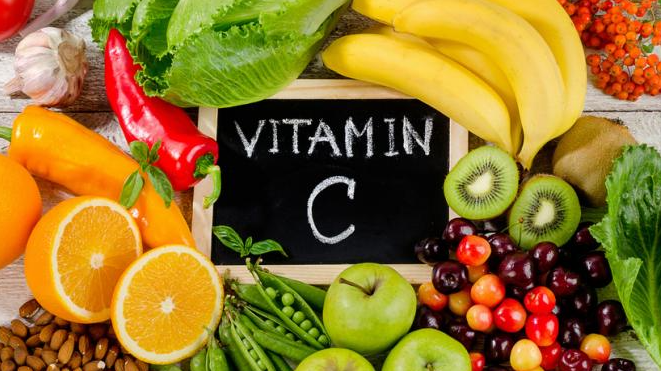
Introduction:
Vitamin C otherwise known as L-ascorbic acid is a water-soluble vitamin.1 It is available in a variety of forms and can be found in dietary foods and natural supplements.1 Since humans cannot create vitamin C from their bodies, they must get it by consumption, therefore vitamin C is a necessary part of one’s diet.1 Vitamin C plays a role in many human functions such as biosynthesis of collagen, protein metabolism and as an antioxidant.1 Currently vitamin C is being researched in its potential role in cancer and cardiovascular diseases.1 It is thought that due to vitamin C being an antioxidant it has a positive effect on free radicals that has the possibility to prevent and delay certain cardiovascular diseases and cancers.1 It is also possible to consider vitamins for gallbladder health.
What are gallstones?
The gallbladder is located underneath the liver and its function is to hold bile to be released into small intestines.2 Gallstones are a condition that may indicate problems with gallbladder function. A gallstone is a hardened deposit mainly consisting of bile which is a digestive fluid.2 They can range in size from as tiny as a grain of salt all the way to a golf ball.2 People are either asymptomatic or symptomatic. Those that are symptomatic have gallstones that are big enough to get lodged in the duct where the gallbladder transports bile into the small intestines.2 People with gallstones may then experience a sharp pain in their abdomen area, back pain, pain in the right shoulder or even nausea and vomiting.2 This pain can range in duration from a few minutes to hours.2 The reason behind gallstone formation is unclear but doctors think it is due to the bile containing to much cholesterol, bilirubin, or improper emptying.2
How does Vitamin C help with gallstones?
Vitamin C exhibits a protective effect on the formation of gallstones.3 There is data that suggest a relationship between vitamin C deficiency and a higher prevalence of gallstones.3 A randomized observational study was performed to see if Vitamin C protected against gallstones.3 This study consisted of 2129 people with ages ranging from 18-65 years in the southern Germany region.3 Data was collected over the time of November/December 2002 and the data was analyzed December 2005 and January 2006.3 The results showed that the prevalence of gallstones was about 7.8% (167/2129).3 Out of those subjects 4.7% (11/232) had gallstones that reported vitamin C supplementation and subjects not reporting routine vitamin C use were 8.2% (156/1897).3 The risk factors for gallstones were being female, genetics, older age and higher BMI.3 Using logistic regression, the odds ratio was 0.34 with a 95% confidence interval and a p-value of 0.01 showing statistical significance.3 In conclusion the results showed vitamin C reduced gallstones prevalence in this set of patients and that regular vitamin C intake can possibly exert a protective effect on gallstone development.3
How do you take vitamin C?
Vitamin C can be consumed in a variety of ways through fruits and veggies or dietary supplements.1 People can consume on average 65-90mg daily up.1 The upper limit of Vitamin C consumption is 2000mg.1 Common fruits that contain vitamin C in them are oranges, grapefruit, strawberries, kiwifruit, and tomatoes to name a few.1 Vegetables containing vitamin C include red pepper, green pepper, broccoli, brussel sprouts and cabbage.1
Safety of vitamin C
Overall vitamin C has a relatively low risk of toxicity as it is an essential part of one’s diet.1 Even at high intakes of vitamin C most side effects that patients experience is gastrointestinal related.1 Side effects may include abdominal cramps, nausea, diarrhea and can even cause equilibrium to be affected due to unabsorbed vitamin C in the GI tract.1 In the Iowa Health Study post-menopausal women were given supplemental vitamin C of at least 300 mg daily.1 This dose of vitamin C was associated with increased cardiovascular mortality risk.1 Of note there has been no other study that observed the same relationship and the mechanism for this effect is unclear.1,3 High vitamin C intake could negatively affect patients with renal disorders.1 It could increase uric acid secretion that can contribute to kidney stones in some patients, but data from studies evaluating this are also conflicting.1 Vitamin C has the potential to interact with certain medications such as chemotherapeutic agents like carmustine, doxorubicin, cyclophosphamide, and chlorambucil.1 Individuals undergoing cancer treatment should consult their oncologist before taking vitamin C supplements. Vitamin C is also known to interact with certain combination statin regimens such as niacin-simvastatin combo.1 This can result in an increased lipid accumulation and is important to discuss with doctor to monitor lipid levels if on this medication.1
Conclusion
Vitamin C is an essential part of people’s diet. The recommended normal daily intake is 65-90mg with an upper limit of 2000mg.1 Patients may experience common GI side effects such as nausea, diarrhea, and abdominal cramps.1 More vulnerable patients such as those with renal disorders and cancer can possibly experience more serious adverse events so it is important to discuss with doctor before taking vitamin C supplementation.1 Studies have evaluated the role vitamin C plays in the reduced prevalence of gallstones.1,3 The results concluded there is a significant relationship between daily vitamin C supplementation and reduced gallstone prevalence in patients.3 Taking vitamins C can therefore improve gallbladder health and can be considered for patients experiencing gallstones, but it is important to follow up with your provider to ensure gallstones are not causing more serious problems such as blockage of the duct leading from your gallbladder to small intestines.3
References:
- “Office of Dietary Supplements – Vitamin C.” NIH Office of Dietary Supplements, U.S. Department of Health and Human Services, 2 Mar. 2018, ods.od.nih.gov/factsheets/VitaminC-HealthProfessional/.
- “Gallstones.” Mayo Clinic, Mayo Foundation for Medical Education and Research, 8 Aug. 2019, www.mayoclinic.org/diseases-conditions/gallstones/symptoms-causes/syc-20354214.
- Walcher, Thomas et al. “Vitamin C supplement use may protect against gallstones: an observational study on a randomly selected population.” BMC gastroenterologyvol. 9 74. 8 Oct. 2009, doi:10.1186/1471-230X-9-74